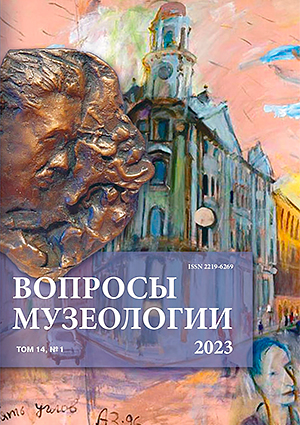Implementation of the Master plan for the restoration and development of Leningrad in terms of organizing cultural and educational work in 1945
DOI:
https://doi.org/10.21638/spbu27.2023.108Abstract
After the Great Patriotic War, the interest towards the history of the city increased among Leningraders, also the regional cultural identity developed, reinforced by the tragic experience of the siege. During this period, the organization of cultural and educational work in Leningrad became one of the most important activities of local authorities. The article is devoted to aspects of the implementation of the cultural and educational policy in Leningrad in 1945, viewed through the prism of the key principles reflected in the Master Plan for the Reconstruction and Development of Leningrad. The main emphasis in the article is made on the consideration of organizational issues that were under the jurisdiction of the executive committee of the Leningrad City Council of Workers’ Deputies. Even before the end of the war, on March 15, 1945, the Department of Cultural and Educational Work was formed. The key vectors of work were: to restore the tourism potential of the suburbs of Leningrad, organization of museum work in terms of preserving the memory of the Great Patriotic War and the blockade, erection of memorials dedicated to the Leningrad epic… The post-war Master Plan was not fully implemented because of the Leningrad affair. This research problem has not been studied enough, although certain aspects of the topic were reflected in historical, museological and cultural literature. The source base for the study was the regulatory and legal materials and office documentation of the Leningrad City Executive Committee of the 1940s, materials from periodicals, data from official museum sites.
Keywords:
Postwar Master Plan for the Reconstruction and Development of Leningrad, Leningrad City Executive Committee, cultural and educational work, Department of Cultural and Educational Work, N.V.Baranov
Downloads
References
Литература
Батурко И.Ю. 2005. История градостроительной политики в Ленинграде (по материалам генеральных планов города с 1917 по 1991 г.): дис. … канд. ист. наук. СПб.: С.-Петерб. гос. ун-т.
Бранденбергер Д. 2016. «Репрессированная» память? Кампания против ленинградской трактовки блокады в сталинском СССР, 1949–1952 гг. (на примере Музея обороны Ленинграда). Новейшая история России 3: 175–186.
Вайтенс А.Г. 2012. Генеральный план восстановления и развития Ленинграда 1948 года (к истории разработки, утверждения и реализации). Архитектурное наследство 56: 356–365.
Лисаевич И.И. 2007. К истории экскурсионного дела в городе на Неве. Мир экскурсий 1: 10.
Максютин Н.Ф. 2003. Очерки истории досуга. Казань: Медицина.
Петров П.В. 2017. Восстановление дворцов и парков Петродворца в 1940–1950-е гг.: основные направления и проблемы. Вестник СПбГУКИ 1 (30): 89–95.
Стрельцов Ю.А. 2003. Культурология досуга. М.: МГУКИ.
Сундиева А.А. и др. (ред.). 2001. Российская музейная энциклопедия: в 2 т. М.: Прогресс, РИПОЛ классик.
Третьяков Н.С. 2015. Дворцы-музеи пригородов Ленинграда. Война. Потери. Возрождение. Вестник. Зодчий. 21 век 1–2 (54): 22–31.
Хренов Н.А. 1998. Мифология досуга. М.: Гос. респ. центр рус. фольклора.
Ярмолич Ф.К. 2012. Организация интеллектуального досуга жителей Ленинграда в конце 1940-х — начале 1950-х гг. Вестник Ленинградского государственного университета им. А.С.Пушкина 4 (2): 145–153.
References
Baturko I.Iu. 2005. The history of urban planning policy in Leningrad (based on the materials of the general plans of the city from 1917 to 1991): PhD thesis. St. Petersburg: St. Petersburg State University. (In Russian)
Brandenberger D. 2016. “Repressed” memory? Campaign against the Leningrad interpretation of the blockade in the Stalinist USSR, 1949–1952 (on the example of the Leningrad Defense Museum). Noveishaia istoriia Rossii 3: 175–186. (In Russian)
Iarmolich F.K. 2012. Organization of intellectual leisure of Leningrad residents in the late 1940s — early 1950s. Pushkin Leningrad State University Journal 4 (2): 145–153. (In Russian)
Khrenov N.A. 1998. The mythology of leisure. Moscow: Gos. resp. tsentr rus. fol’klora Publ. (In Russian)
Lisaevich I.I. 2007. On the history of excursion business in the city on the Neva. Mir ekskursii 1: 10. (In Russian)
Maksiutin N.F. 2003. Essays on the history of leisure. Kazan: Meditsina Publ. (In Russian)
Petrov P.V. 2017. Restoration of palaces and parks of Petrodvorets in the 1940 — 1950s: main directions and problems. Vestnik SPbGUKI 1 (30): 89–95. (In Russian)
Strel’tsov Iu.A. 2003. Culturology of leisure. M.: MGUKI Publ. (In Russian)
Sundieva A.A. et al. (ed.). 2001. Russian Museum Encyclopedia: in 2 vols. Moscow: Progress Publ.; RIPOL klassik Publ. (In Russian)
Tret’iakov N. S. 2015. Palaces-museums of the suburbs of Leningrad. War. Losses. Renaissance. Vestnik. Zodchii. 21 vek 1–2 (54): 22–31. (In Russian)
Vaitens A.G. 2012. General plan for the restoration and development of Leningrad in 1948 (on the history of development, approval and implementation). Arkhitekturnoe nasledstvo 56: 356–365. (In Russian)
Downloads
Published
How to Cite
Issue
Section
License
Articles of "The Issues of Museology" are open access distributed under the terms of the License Agreement with Saint Petersburg State University, which permits to the authors unrestricted distribution and self-archiving free of charge.





